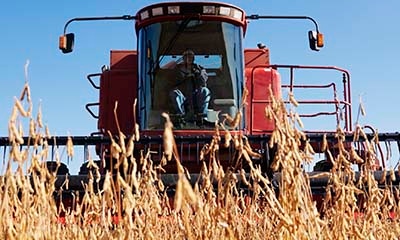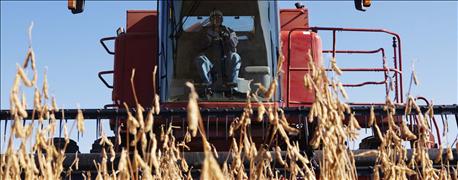
A hearing is scheduled at 10 a.m. EST March 1 in the Senate Agriculture Committee on the chairman’s mark on biotechnology labeling.
The proposal, by agriculture committee chairman Sen. Pat Roberts, R-Kansas, adds a national voluntary bioengineered food labeling standard to federal law.
It directs the agriculture secretary to establish a national voluntary bio-engineered food labeling standard for food within two years of enactment. It doesn’t allow states to have their own labeling standards.
A hearing was previously scheduled for Feb. 25, but it was postponed.
Related story: Ag committee to consider labeling bill

One in three rows of U.S. crops is exported. (Photo: Fuse/Thinkstock)
Minnesota Farm Bureau president Kevin Paap was one of 750 Farm Bureau leaders in Washington, D.C., last week meeting with lawmakers to discuss the labeling issue and the Trans-Pacific Partnership.
It’s important to get something done on the labeling issue soon as the Vermont labeling law goes into effect July 1 and there needs to be a timeline for manufacturers if they are going to have to come up with a separate label, Paap said.
The House of Representatives approved H.R. 1599, the Safe and Accurate Food Labeling Act of 2015, by a 275-150 vote in July 2015. Opponents have another name for the bill, calling it the DARK Act, for Denying Americans the Right-to-Know.
Related story: Transparency needed for more than just GMOs
Paap said staff from Roberts’ office and the office of Sen. Debbie Stabenow, D-Mich., ranking member on the committee, are working on the proposal to come up with something that will have bipartisan support in the committee.
It’s important the bill have bipartisan support in the committee to make it through the full Senate and onto the president’s desk for him to sign, Paap said.
Trade deals help create demand for U.S. ag products
The Trans-Pacific Partnership is a good deal for America’s farmers as they grow more than Americans can consume, he said.
Related story: Trade pact would boost agriculture
An increase in demand is one solution for low prices and expanding market access through trade agreements is one way to increase demand.
It’s unlikely the TPP will come before Congress until after the November election, Paap said, but Farm Bureau plans to use that time to clear up misconceptions and misunderstandings about the 12-country multilateral trade agreement that was negotiated over seven years and contains 30 chapters.
“We’ve got to remember that this is going to be a cornerstone for future growth,” he said.
The American Farm Bureau Federation last week released an economic analysis of the TPP that found farm prices will increase for corn, soybeans, wheat, rice, beef, pork, poultry, butter, cheese, nonfat dry milk and milk if the TPP is passed.
Related story: AFBF will boost net farm income
Farm Bureau members who met with members of Congress last week talked about what passage of the trade agreement means to them on their farms.
Exports are important to U.S. farmers, as one in three acres planted is exported and about a third of U.S. gross farm income comes from exports, according to Farm Bureau.
Paap said other countries involved in the TPP may decide to do bilateral agreements if the multilateral deal fails. Trade will move ahead, he said, with or without the United States.
Once the trade deal is submitted, Congress has 90 legislative days to act on it.
About the Author(s)
You May Also Like




